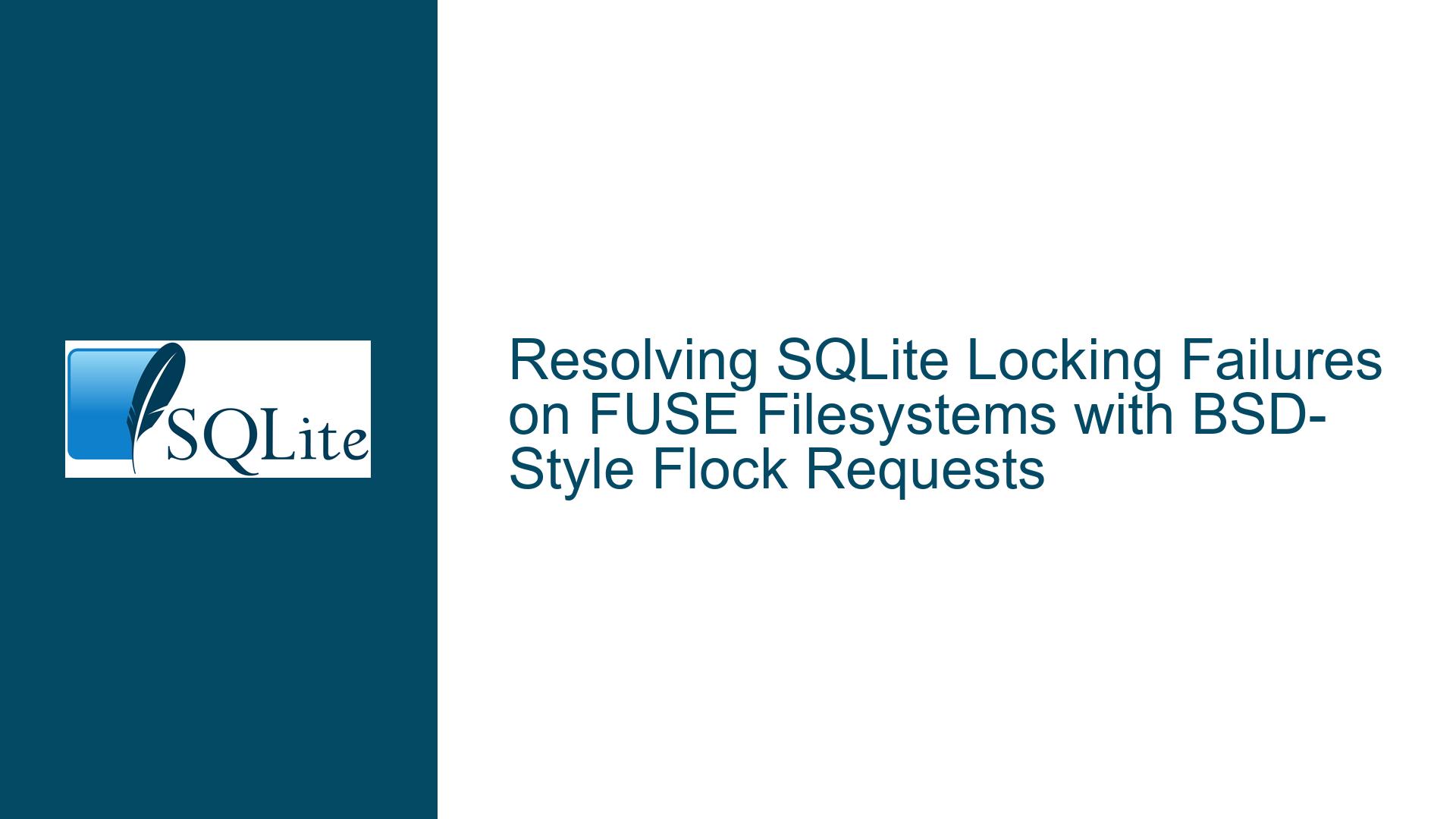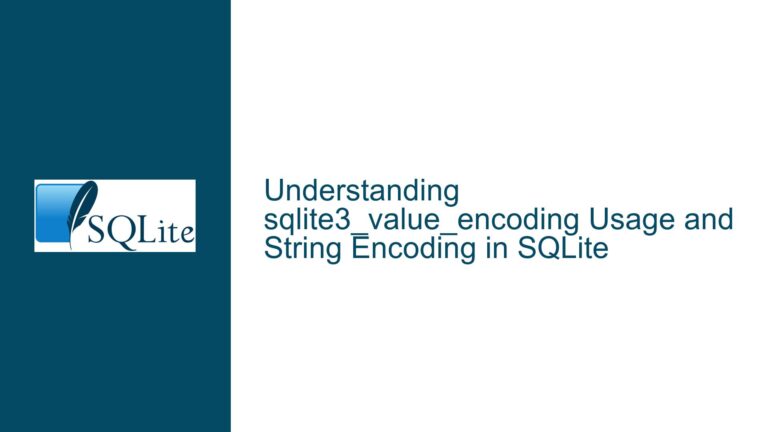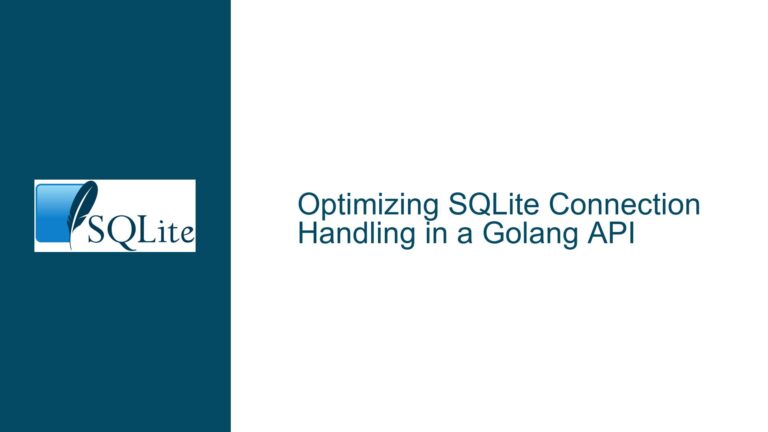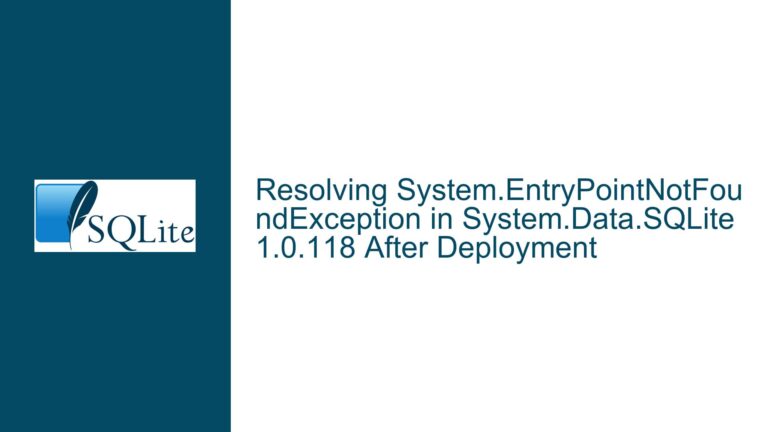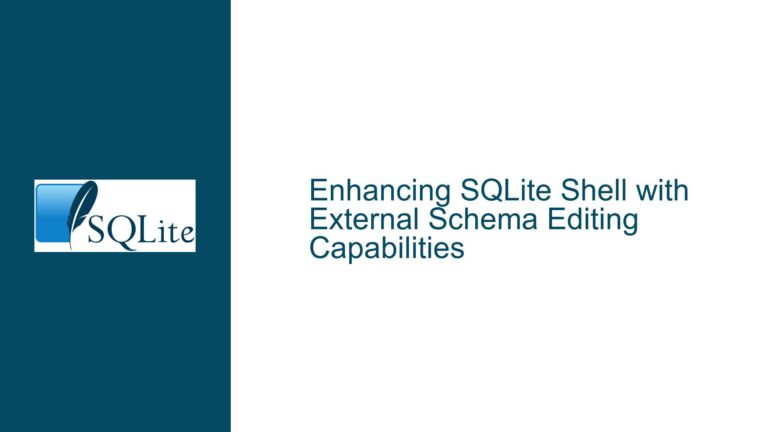Resolving SQLite Locking Failures on FUSE Filesystems with BSD-Style Flock Requests
Issue Overview: SQLite’s Reliance on POSIX File Locking in FUSE Environments
SQLite employs file locking mechanisms to enforce database concurrency control and transaction isolation. On Unix-like systems, the default Virtual File System (VFS) layer uses POSIX advisory locks implemented via the fcntl() system call. These locks coordinate read/write access to database files across processes. However, this approach assumes the underlying filesystem fully supports POSIX locking semantics.
The problem arises when SQLite operates on FUSE (Filesystem in Userspace)-based filesystems that lack robust POSIX lock compatibility. Specifically, some FUSE implementations (e.g., user-space network mounts, custom storage layers) only support BSD-style file locks (flock()) due to design constraints. BSD locks differ from POSIX locks in scope and behavior: they are advisory, apply to entire files (not byte ranges), and have distinct inheritance rules across fork() calls. When SQLite attempts to use fcntl()-based locks on such filesystems, operations like acquiring reserved or pending locks may fail silently or return incorrect lock statuses. This leads to database corruption, transaction rollbacks, or unauthorized concurrent writes.
The core issue is the absence of a built-in SQLite VFS that substitutes fcntl() with flock() for systems where POSIX locks are unavailable. The user’s request for a unix-bsdflock VFS highlights this gap. Without it, SQLite cannot safely handle concurrent access on FUSE filesystems that exclusively support BSD-style locking. The problem is exacerbated when applications rely on FUSE for distributed storage, encryption, or specialized data processing, as these layers often prioritize flock() compatibility for simplicity.
Possible Causes: Mismatch Between SQLite’s Locking API and Filesystem Capabilities
FUSE Filesystem Limitations in POSIX Lock Emulation
Many FUSE drivers omit POSIX lock support (fcntl()operations) due to complexity in reimplementing kernel-level locking semantics in user space. Instead, they provide basicflock()compatibility, which is simpler to map to their internal concurrency models. For example, network-based FUSE filesystems might useflock()as a lightweight cross-node coordination mechanism but lack byte-range locking. SQLite’s default unix VFS cannot detect this mismatch, leading to incorrect lock state assumptions.Inadequate Error Handling in Lock Acquisition Workflows
When SQLite’s default VFS encountersfcntl()failures on FUSE mounts, it may misinterpret errors likeENOLCK(no locks available) orEOPNOTSUPP(operation not supported) as transient issues. This triggers retry loops that exhaust resources without resolving the root cause. The absence of explicit error codes for unsupported locking operations compounds the problem, leaving SQLite unaware of the filesystem’s limitations.Misconfiguration of Locking Protocols in Hybrid Environments
Systems combining FUSE with other storage layers (e.g., NFS, encrypted volumes) might inherit conflicting locking behaviors. For instance, a FUSE layer could forwardflock()calls to a backend that uses POSIX locks, creating inconsistent lock states. SQLite’s VFS has no mechanism to negotiate or validate the effective locking protocol, increasing the risk of race conditions.
Troubleshooting Steps, Solutions & Fixes: Implementing a Custom VFS with BSD-Style Flock Integration
Step 1: Verify Locking Compatibility on the Target FUSE Filesystem
Before modifying SQLite, confirm that the FUSE filesystem supports flock() but not fcntl(). Use a test program to attempt both lock types:
#include <sys/file.h>
#include <fcntl.h>
#include <unistd.h>
int main() {
int fd = open("testfile", O_RDWR | O_CREAT, 0644);
// Test POSIX lock
struct flock fl = { .l_type = F_WRLCK, .l_whence = SEEK_SET };
if (fcntl(fd, F_SETLK, &fl) == -1) {
perror("fcntl failed");
}
// Test BSD lock
if (flock(fd, LOCK_EX | LOCK_NB) == -1) {
perror("flock failed");
}
close(fd);
return 0;
}
If fcntl reports EOPNOTSUPP while flock succeeds, proceed with a custom VFS.
Step 2: Develop a BSD flock-Compatible VFS
SQLite’s VFS layer allows substituting file locking logic. Create a new VFS shim that replaces fcntl()-based locks with flock():
- Clone the Unix VFS Structure: Start with the default Unix VFS (e.g.,
unix-exclorunix-dotfile). - Override Locking Methods: Reimplement
xLock,xUnlock, andxCheckReservedLockusingflock().static int bsdflockxLock(sqlite3_file *id, int lockType) { struct unixFile *pFile = (unixFile*)id; int rc = 0; int lType = (lockType == SHARED_LOCK) ? LOCK_SH : LOCK_EX; rc = flock(pFile->h, lType | LOCK_NB); return (rc == -1) ? SQLITE_BUSY : SQLITE_OK; } - Handle Lock Escalation: SQLite expects granular control over lock states (unlocked → shared → reserved → pending → exclusive). Map these to
flock()’s shared (LOCK_SH) and exclusive (LOCK_EX) modes, ignoring intermediate states if the filesystem doesn’t support them.
Step 3: Compile and Register the Custom VFS
Embed the VFS in SQLite by overriding build flags or dynamically registering it at runtime:
sqlite3_vfs_register(&bsdflockVfs, 1);
Invoke SQLite with ?vfs=bsdflock or set PRAGMA vfs=bsdflock.
Step 4: Validate Lock Behavior Under Concurrency
Simulate multi-process access to the database using parallel transactions. Monitor lock acquisition with lsof -n -p <PID> or cat /proc/locks. Ensure exclusive locks block shared writes and vice versa.
Alternative Solutions
- Use SQLite’s Write-Ahead Log (WAL) Mode: Reduces reliance on file locks but still requires
fcntl()for shared memory coordination. - Patch FUSE Drivers: Modify the FUSE implementation to translate
fcntl()locks toflock()calls internally. - Adopt Networked Locking Services: Delegate lock management to a daemon (e.g.,
dqlite) when FUSE operates in distributed environments.
By addressing the VFS layer’s dependency on POSIX locks, SQLite can safely operate on FUSE filesystems with BSD-style flock support, ensuring transactional integrity without filesystem modifications.
